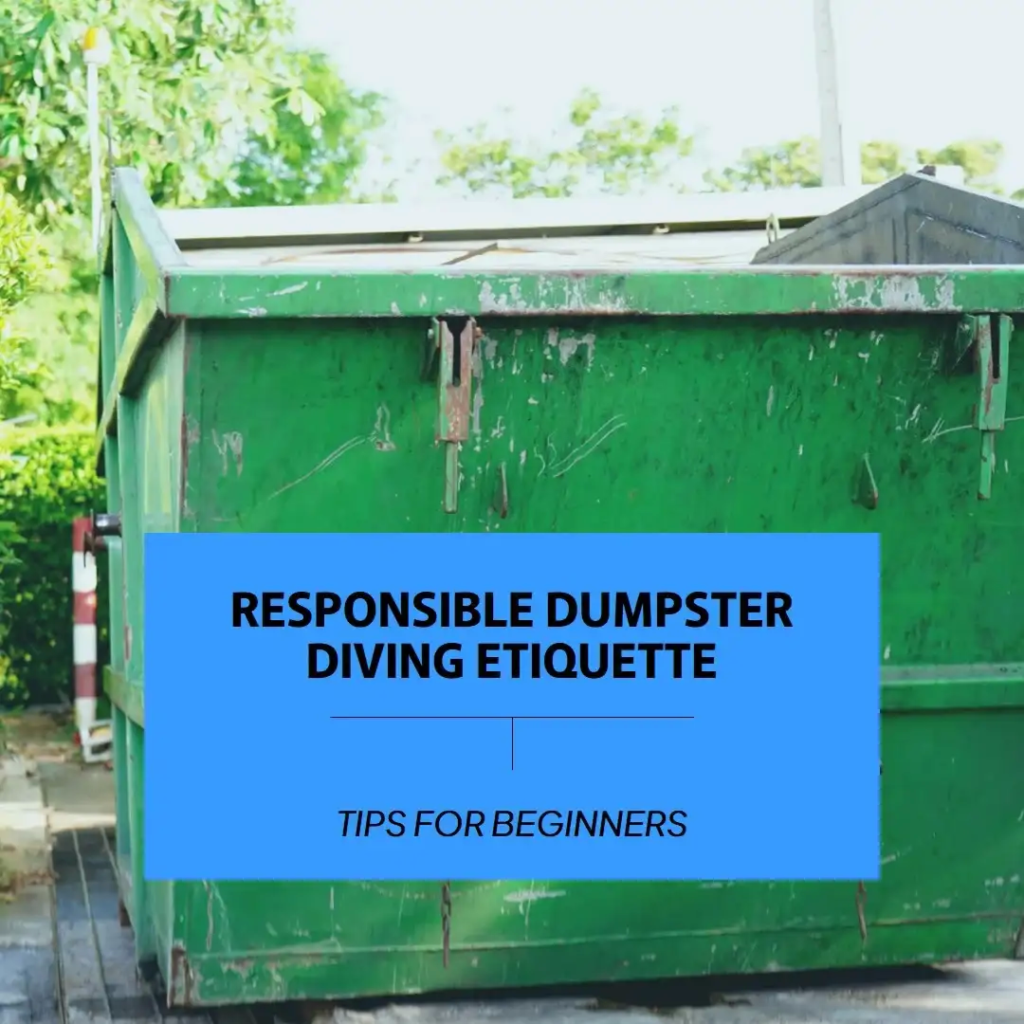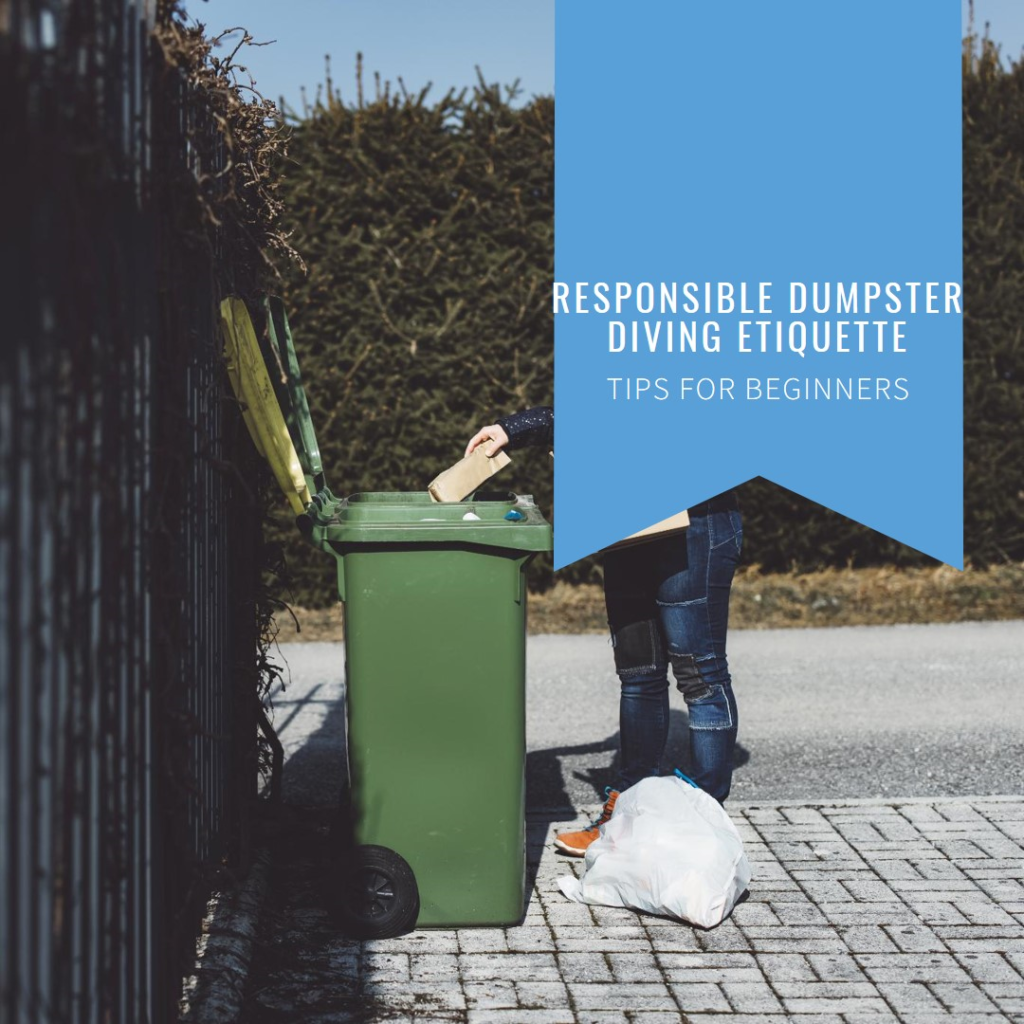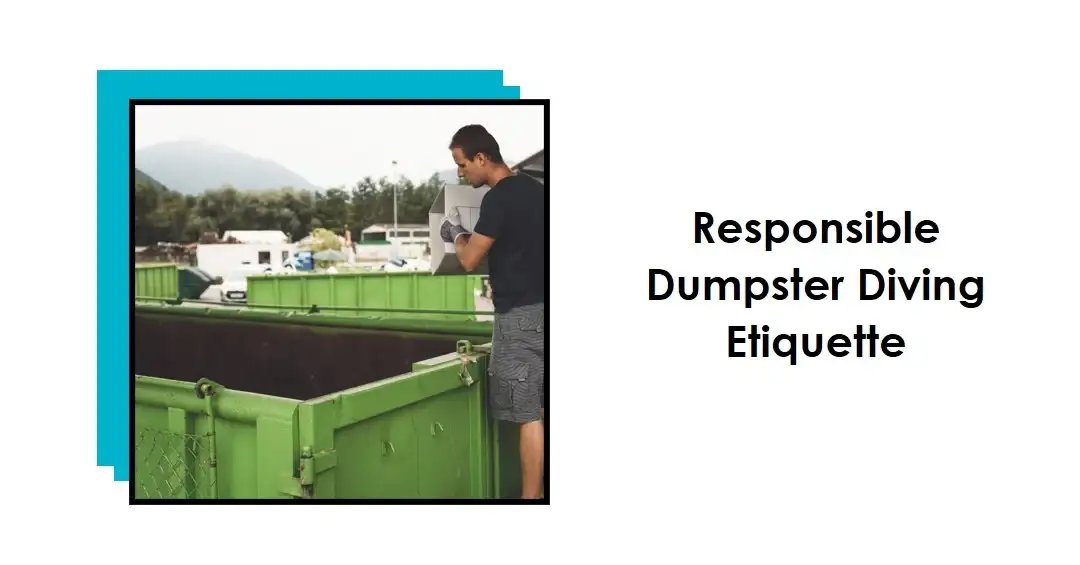Dumpster diving is the practice of rummaging through trash bins, dumpsters, or other discarded items in search of useful items that can be recycled, repurposed, or used for personal purposes. It is often associated with finding discarded food, but people also engage in dumpster diving to collect valuable items, discarded furniture, electronics, or even clothing.
Importance of responsible dumpster diving etiquette
Responsible dumpster diving etiquette is crucial to ensure the safety of individuals engaging in this activity and to maintain a positive image of the practice. Some key reasons why responsible etiquette is important include:
- Respect for property: By being careful not to damage or leave a mess while diving into dumpsters, individuals show their respect for other people’s property and private spaces.
- Safety considerations: Dumpster diving can involve potential health and safety risks, such as sharp objects, broken glass, or hazardous materials. By following responsible etiquette, divers can minimize these risks and protect themselves from any harm.
- Building positive relationships: By practicing responsible dumpster diving, divers contribute to building positive relationships with businesses and communities. This can help foster a supportive environment for dumpster diving and lead to potential collaborations or partnerships for initiatives focused on waste reduction and sustainability.
- Preserving the environment: Dumpster diving promotes the reuse and recycling of items that would otherwise end up in landfills, reducing waste and minimizing environmental impact.
- Encouraging responsible consumption: By highlighting the value of discarded items and finding new purposes for them, responsible dumpster diving encourages a more mindful approach to consumption, reducing the demand for new products and resources.
Adhering to responsible dumpster diving etiquette can contribute to the positive perception of this practice and its potential benefits for individuals and society as a whole.
Be Informed
Before engaging in dumpster diving, it is important to familiarize yourself with the laws and regulations in your local area. Some cities or municipalities may have specific rules regarding scavenging through trash bins. Researching these regulations will help you avoid any legal complications and ensure that you are within your rights to participate in this activity.
Know the potential risks and dangers
While dumpster diving can be a rewarding activity, it is essential to be aware of the potential risks and dangers involved. Familiarize yourself with the common hazards, such as sharp objects, broken glass, or hazardous materials, that you may encounter while diving. Take necessary precautions to protect yourself, such as wearing gloves, closed-toe shoes, and carrying a flashlight. By being informed about the risks, you can minimize the chances of accidents or injuries during your dumpster diving adventures.
Prepare Properly
To ensure your safety while dumpster diving, it is crucial to wear the right clothing and protective gear. Opt for long sleeves, long pants, and closed-toe shoes to protect yourself from sharp objects and hazardous materials. Additionally, wearing gloves and a mask can provide an extra layer of protection against potential pathogens or chemicals that may be present in the dumpsters.
Bring necessary tools and supplies
Before embarking on your dumpster diving adventure, make sure to gather all the necessary tools and supplies. These may include a flashlight to help you see inside the dumpsters, a sturdy ladder or step stool for reaching higher bins, and reusable bags or containers to collect your finds. It is also helpful to bring some hand sanitizer or wet wipes to clean your hands after rummaging through the trash.
By taking these preparations, you can ensure a safer and more enjoyable dumpster diving experience. Remember to always be respectful and abide by the rules and regulations in your local area.

Choose the Right Time and Place
– Late at night or early in the morning: These are usually the best times to go dumpster diving as there are fewer people around, reducing the chances of being caught or confronted.
– Check store schedules: Find out when local stores close or during times when they restock their inventory. This increases the likelihood of finding discarded items in good condition.
Finding suitable locations
– Research local laws: Make sure to familiarize yourself with the laws and regulations regarding dumpster diving in your area to avoid any legal issues.
– Explore industrial areas: Look for dumpsters near warehouses, factories, or large retail stores as they tend to dispose of a significant amount of items that can be salvaged.
– College campuses and residential area: Check out dumpsters near college campuses or residential areas where people often discard unwanted items during move-out seasons.
Remember, dumpster diving can be a fun and rewarding activity, but always prioritize your safety and respect the property of others.
Leave No Trace
– Properly bag and tie your garbage: When you go dumpster diving, it’s important to dispose of any trash you create or find in a responsible manner. Always use trash bags and make sure they are securely tied to prevent any littering.
– Clean up after yourself: After rummaging through dumpsters, take a few minutes to tidy up the area and leave it as you found it. This shows respect for the environment and reduces the impact on the community.
Respect the property and privacy of others
– Avoid trespassing: Only dive in dumpsters that are accessible from public areas and do not enter private property without permission. Trespassing is not only illegal but also disrespectful to the owners.
– Do not disturb others: While dumpster diving, keep your noise level down and avoid making a mess. This helps maintain a positive image of the activity and avoids causing any disruptions to nearby residents.
Remember, by practicing responsible dumpster diving, you can enjoy the experience while minimizing any negative impact on the environment and those around you.
Safety First
- Exercise caution around sharp objects: When engaging in dumpster diving, it’s essential to be vigilant for potential hazards like broken glass, nails, or other sharp items that may pose a risk of injury. Utilize protective gloves and handle these materials with care to ensure your safety throughout the process.
- Steer clear of chemical containers: Be mindful to avoid containers that might house hazardous substances, such as cleaning agents or toxic chemicals. Interacting with these containers can pose health risks, and it’s advisable not to come into contact with them during your dumpster diving endeavors.
- Refrain from consuming found food items: While some argue that dumpster diving for food is safe, it’s prudent to err on the side of caution and abstain from consuming items discovered in dumpsters. There exists a potential risk of contamination or spoilage, which could result in foodborne illnesses. Prioritize your well-being by refraining from the consumption of such items.
Stay aware of your surroundings
- Exercise caution near traffic: Dumpster diving may occur in proximity to roads, so it’s crucial to remain mindful of passing cars. Always maintain awareness of your surroundings and ensure a safe distance from traffic to minimize the risk of accidents or injury.
- Be cautious of unstable structures: Some dumpsters or the structures around them might be unstable or in poor condition. Take extra precautions to avoid accidents or collapses while engaging in dumpster diving. Prioritize your safety by being vigilant and mindful of the structural integrity of the surroundings.
- Guard against pests: Dumpster diving can attract pests such as rats or insects. Stay vigilant for signs of infestation and take necessary precautions to avoid coming into contact with these pests. Protect yourself by being aware of your surroundings and implementing measures to prevent interactions with unwanted creatures.
Remember, prioritizing safety is key when engaging in dumpster diving. By being cautious of hazardous materials and staying aware of your surroundings, you can ensure a safer and more enjoyable experience.

Be Respectful
- Maintain cleanliness in the dumpster area: Ensuring the cleanliness and tidiness of the dumpster area is crucial after completing your diving activities. Properly dispose of any generated trash and make a conscious effort to leave the surroundings in a neat condition. Taking responsibility for the cleanup helps preserve the environment and promotes a positive dumpster diving experience for both you and others.
- Prevent property damage: Exercise mindfulness when navigating the dumpster and its immediate surroundings. Avoid causing damage to fences, gates, or any other property while accessing or exiting the dumpster. Respecting the property in the vicinity is essential for fostering a considerate and responsible approach to dumpster diving.
Interact politely with employees or authorities if confronted
- Demonstrate courtesy and respect: In the event of encountering employees or authorities during your dumpster diving activities, maintain a calm and polite demeanor. Articulate your intentions courteously and be willing to cooperate with any requests or instructions they may have. By demonstrating respect, you contribute to a positive interaction and help foster understanding about your dumpster diving activities.
- Adhere to local regulations: Take the time to familiarize yourself with any applicable local laws or regulations related to dumpster diving. Show respect for these rules and avoid engaging in confrontations with authorities. Complying with local regulations ensures a harmonious coexistence with the community and minimizes potential legal complications associated with your dumpster diving endeavors.
Remember, being respectful is crucial when engaging in dumpster diving. By keeping the area clean and treating others with politeness, you can contribute to a positive image of the activity and reduce potential conflicts.
Share the Wealth
- Prevent hoarding: When engaging in dumpster diving, it’s essential to adhere to a principle of taking only what is genuinely necessary. Avoid collecting excess items that may ultimately go to waste, and prioritize taking items that serve a practical purpose in your life.
- Share unneeded items: Embrace the concept of paying it forward by donating or sharing items that you come across but don’t require or already have duplicates of. Consider contributing to those in need or distributing items among friends, family, or local communities.
Remember, practicing mindfulness and generosity while participating in dumpster diving can have a positive impact on your community. By taking only what is essential and sharing unneeded items, you actively contribute to waste reduction and promote a more sustainable and considerate approach to resource utilization.
Conclusion
- Take only what you need and avoid hoarding excess items
- Donate or share unneeded items with others
- Be mindful of others and the impact of your actions
Dumpster diving can be a great way to reduce waste and find useful items, but it’s important to do so responsibly. By following the guidelines mentioned above, you can practice responsible dumpster diving etiquette and make a positive impact on the environment and your community. Remember, it’s not just about taking what you need but also sharing the wealth with others. Let’s all work together to create a more sustainable future.

Greetings, eco-conscious explorers! I am Arjun Bandari, a seasoned Dumpster Diving enthusiast with over a decade of expertise in uncovering hidden treasures amidst the discarded. My journey into this unconventional lifestyle began in New York, fueled by a passion for sustainability and a desire to challenge the norms of our throwaway culture.
With a bachelor’s in Enviromental Health and Safety, I seamlessly blend academic insights with practical experiences to navigate the world of Dumpster Diving. Over the years, I’ve become a recognized figure in the sustainable living community, sharing my discoveries and insights through workshops, community outreach, and various online platforms.
My commitment to promoting eco-friendly practices has garnered attention from local and regional media, earning me featured spots in publications that highlight the environmental impact of Dumpster Diving. As an advocate for responsible waste management, I have been honored with awards recognizing my contributions to the field.
In addition to my hands-on experiences, I’ve extended my reach through various published works, shedding light on the untapped potential within discarded items. Whether it’s repurposing furniture, salvaging electronics, or sharing practical tips for fellow Dumpster Diving enthusiasts, I am dedicated to inspiring a conscious and sustainable way of living.
Join me on this exciting journey as we redefine the narrative around waste, discover hidden gems, and collectively contribute to a greener, more sustainable future. Together, let’s dive into the world of Dumpster Diving and uncover the beauty beneath the surface of our disposable society.

